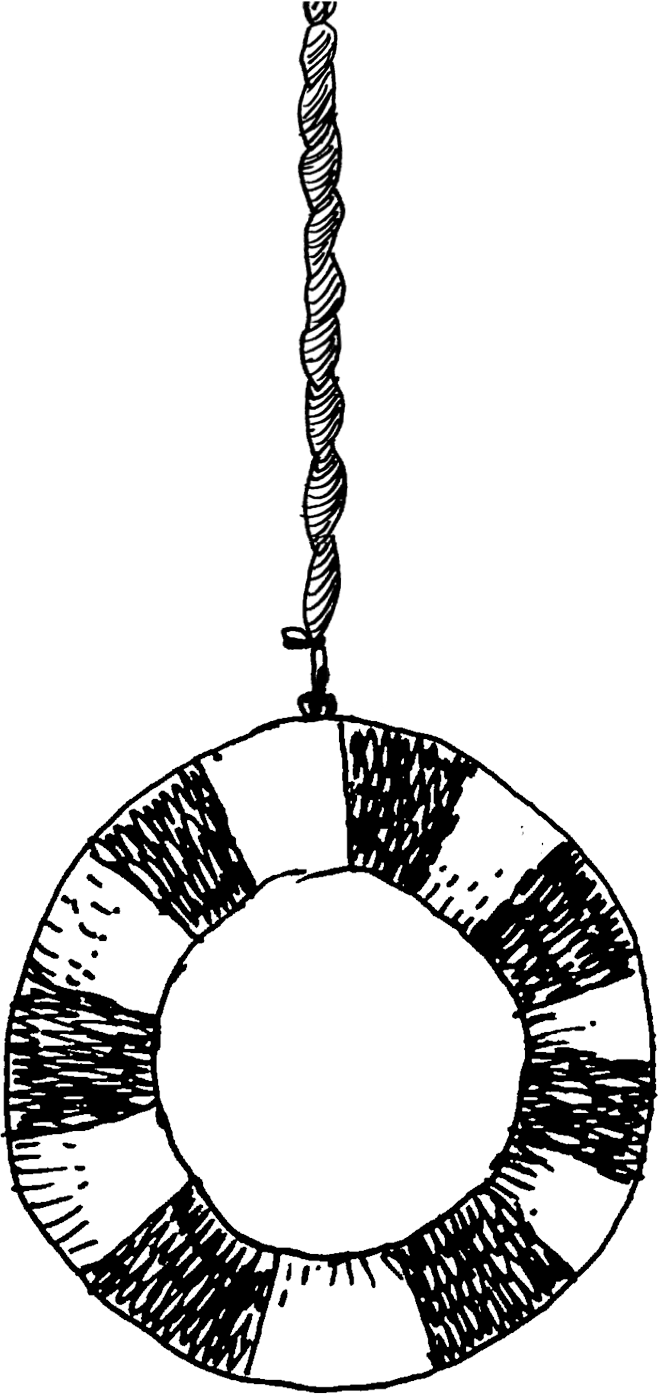Wanna Bee Radhi
Staying Afloat With Radhi-O…
Text by Ben Liew
Illustrations by kkkkkiddddd

Radhi sits by the swimming pool as his wife and daughter play in water. After two smokes, a long toilet break, and changing out of his wet clothes, the OAG frontman returns. “Cirit-birit la bro…” confesses the 38-year old Sibu-born local, the result of years of heroin abuse on his digestive tract – or maybe just a bad lunch prior? Radhi pulls up a deck chair. “We’re going to play in Medan this Saturday, but the promoters over there are still using our old photo, obviously, they didn’t keep up,” says Radhi as he shows the flyer on the cracked screen of his smartphone.
Most people know Radhi as the embattled, sole remaining original member and frontman of OAG. They know all about his publicised treatment of addiction; going in and out of rehab for the better part of the last decade and consequently coming out with songs about repentance like ‘BismilLAHIRrahmanirrahim’ and ‘Insya-Allah’. They see a fun and witty guy, a free spirit, plagued with the typical rockstar syndrome – become famous, have fun, run out of creativity, try drugs, and die. Some see that as part of the package with OAG as though there aren’t enough rockstar tragedies.
Just a few days before this interview, a friend from The Wknd Sessions – we’d been filming a promo with Radhi who was headlining our final Piring-Piring (a JUICE-Wknd Sessions event collaboration) – remarked to me, “I don’t think he’ll quit drugs. He’s stuck in that [drug-induced] world now even though he’s sober. It’ll be hard to stay sober.”
It’s hard not to feel sorry for Radhi and at the same time, just let him be. “With or without drugs, I’m still Radhi OAG,” said Radhi during the promo shoot. However, he also made a passing remark that he “really missed drugs a lot,” causing his manager to walk-off halfway during the shoot. It’s hard to take Radhi seriously.

Radhi seems to find humour in almost everything. Maybe that’s how he’s been surviving post-addiction withdrawal, by focusing on the positive. His upcoming musical collaboration with Rani Kulup aka Kipidap (the head of NGO MJMM, who recently made the news by suggesting authorities impose a 20-year jail-term and canning upon those who misuse social media) makes you wonder if it were poor judgment or just a joke. Thank god it was more of the latter. “He’s like John Lennon, he wants peace. If you look past the bad press, he really wants to make a change and do good things for Malaysia. He was at the Red Shirt rally, but he wore green… He’s weird, man. I did it for fun,” Radhi admits merrily.
In my teens, I saw OAG perform twice at Subang Parade (yes, they were mall gigs). It was scary to see the transformation in just a couple of years. From the height of seeing them live the first time (the ‘60s TV’ music vid had just dropped) to a very disappointing performance the next year, to now collaborating with Kipidap, what went wrong? Is the world insane?
Of course not. In an alternate reality, I’m sure Kipidap is Lennon, and Radhi is more understood as an artiste.
In May 2012, I saw a different side of Radhi whilst interviewing him as part of a Father’s Day feature. We saw a repentant father struggling to get his life back together and doing a pretty good job at it. He relapsed a year later.
Many people don’t see the real Radhi behind the character due to his affable nature. “Even though I became a musician, I wanted to be a businessman,” he says half-sarcastically. “I’m doing it all the way with [artiste management] Talentscape, we have a proper plan. I can’t be fooling around anymore.”
The hidden Producer behind all of the albums put forth by OAG, Radhi, even at this stage when he should be focusing on making a definitive comeback, is deviating with producing a new band of upstarts. “When I heard them [Bambinokiss], I thought that this band really reminds me of myself. I kept promoting them to Talentscape. Last time, we had Positive Tone. I felt like we needed a new family. I’m not trying to take over even though I had a few ideas. [Positive Tone label boss] Paul Moss never wanted to change us.”
As a musically-inclined kid hanging around Central Market, going to tea dance parties at Piccadilly, hanging out with punk veteran Joe Kidd and Infectious Maggots’ Fathul; Radhi penned his first song ‘Knocked Silly’ and recorded it with Flop Poppy (FP) in ’91, before leaving the band “due to creative differences” to form OAG with classmates from his Bangsar tuition centre whilst studying for his SRP.
“I was the youngest in Flop Poppy, the others were like 10 years older than me,” as Radhi remembers it. It was in Flop Poppy that Radhi received his first exposure to hard drugs, though as a 13-year old kid, and being naïve enough to ignore what was going on, Radhi never tried anything his bandmates were doing. Far from the decadent rockstar he is now (or was), when he started his new band, OAG, it was just a bunch of clean kids who never expected much to happen (unlike now, when you hear of notorious OAG rock n roll stories like when their drummer puked on the drums mid-set at a show). “The first time we (OAG) were called Slimeballs. Then one night I had a dream, I went into a cave and outside the cave, there was writing on the rock that said ‘Old Automatic Garbage.’ I was listening to a lot of this industrial band, Old Lady Driver, at the time. Maybe that’s where the name came from.”
“There were too many metal bands at the time in the late ‘80s metal scene. I was listening to Slayer, Obituary, Kreator!” exclaims Radhi as he holds up the metal sign. It wasn’t long until the metal scene gave way to grunge and Brit rock. “I was in the process of discovering myself musically.” Radhi and company, whether it was with FP or OAG, were into the new trends ahead of their peers. “I had no intention of grabbing attention. I just did it… you know?” he recalls of his switch from Slayer to Stone Roses. “There weren’t a lot of non-metal indie bands when we started, there was Spiral Kinetic Circus, Deflowered… not many bands at all compared to the metal scene. Even [Flop Poppy’s frontman] Andy was into metal.”
“I wrote in English so I could get close to my British stepdad. My mum remarried this man from Bradford, UK. I really wanted to impress him,” laments Radhi. In return, his stepfather introduced him to old psych rock, The Velvet Underground and Pink Floyd. “The Velvet Underground really got me into recording. This band is from the ‘60s yet they sound so current, I thought. Every time he went back to UK, he would come back with cassette tapes like Radiohead and Manic Street Preachers. He helped me with my transition from metal to indie music. Although since he and my mother got a divorce, I haven’t seen much of him. The last time was about four years ago. He got remarried.”
Seemingly coming out of nowhere, OAG’s first album under Positive Tone was recorded in two days at Kenny Music Studio (owned by veteran Malay-singing, Chinese producer-musicians Kenny, Remy, and Martin) in Seksyen 16, PJ. “We were inspired by Napalm Death because they made their album Scum in one day. So we made ours in two days, live recording. But the vocals took about 7 months to record after that because I wasn’t a proper singer. Paul Moss was experimenting with QBase. He was in the middle of learning how to use the new recording software, I saw him going amok in the studio, throwing the keyboards because he was punching in at the wrong parts or did something wrong.”
“With or without drugs, I’m still Radhi OAG”


Ahead not just musically, they also adopted a more independent label. After rejecting Universal and opting for Positive Tone, OAG skyrocketed with their performance debut on MetroVision – an alternative channel with urban programmes (Peninsular Malaysia only had four channels at the time). “Thankfully, Yogi B and Anand – the original members of Poetic Ammo – discovered our demo and passed it to Paul Moss. Before that, we thought we were going to do a demo and that’s it. I’d get on with my life, go to university, you know, be normal. But in reality, Lam and Ivan were the ones who left OAG… because they wanted to be normal.”
But even with their album going platinum, getting on a Coca-Cola commercial, penning and performing the Official 1997 FIFA World Youth Cup song, and ‘60s TV’’s initial success, OAG was in trouble. Heroin was not as passé in KL back then. Ecstasy only arrived in full force when the clubs came in and that too took a while to grow into the so-called epidemic. So heroin was the predominantly hard-drug trend at the time. “I was born in Sibu, raised in Kuching, and fucked up in KL. If I had only listened to Paul Moss and [8TV CEO] Ahmad Izham, I would be the no. 1 artist right now… above Siti Nurhaliza because Siti is an ardent OAG fan!” Radhi bursts out with laughter before calmly stating, “She brought us on tour twice. But I made a lot of mistakes. I missed the flights… twice! She told me, ‘Rugi lah… You could have been big in Indonesia.’ And she tried to help us, help me, many times but… I kind of ripped her off… unintentionally! She paid me half the money to finish a song but I haven’t finished it. ‘Siti, I promise you I will finish that song, maybe it’s a different song, but it’s my responsibility to finish it, I hope you understand, sis!” Radhi proclaims this closely to my voice recorder before pausing to reflect, “I don’t know, man… I think her husband is still angry though. To me, it’s still my responsibility… maybe we can do a duet song?”
Radhi’s long-term struggle with heroin addiction started when a skateboarding friend introduced him to the substance in ’94. “Kurt Cobain was one person I really idolised. I was into his lifestyle and his philosophy of shunning success. You know, I was still young and immature. Then I started doing heroin. It was a pretty hardcore drug, I didn’t know that it was going to get me hooked. At the time, I thought it was just another process I was going [through], but it became my drug of choice, my favourite drug. I met a friend who was into skateboarding, just like me. I was having a very bad flu so he said ‘Radhi, do you want some effective medicine that will get your flu off of you just like that?’ I didn’t know he was going to bring me to this place… The rest is history. I didn’t shoot, just chased the dragon. The flu was gone after the first time and a couple of weeks later I was fine. But after two to three months, I was like ‘Wow, I still remember that drug, man… it was a cool drug’ and that’s how I got hooked. It wasn’t like today I take it, and tomorrow I’m hooked – it’s a sneaky drug.”
1999’s Melody Mocker included an interactive CD-ROM but even with strong backing from the label, OAG began to tumble. “I didn’t turn up for interviews, had fights with engineers, organisers, Paul Moss, and Ahmad Izham, didn’t turn up for recording, stopped meeting my family, and isolated myself. It got so bad that when Positive Tone had a chance to do a show in London featuring their signed acts, they didn’t want to bring OAG,” says Radhi sounding as embarrassed as he is confused about the past. “Melody Mocker took two years to finish because I was so hooked on heroin!”
“I was born in Sibu, raised in Kuching, and fucked up in KL.”
As Radhi struggled to keep his grip on reality, he owed money to Positive Tone (because he had “mintak advance”), which led him to produce Malay albums to repay his debt. In hindsight, OAG should have done this earlier. Inspired by Indonesia’s Gigi, Malay-language OAG songs like ‘Slumber’ and albums like Akustatik brought the band critical acclaim from both sides of the language-divide. Opera Radhi-o Friendly, their 2002 debut Malay-album, sold 50,000 units.
Brothers Lam and Ivan (the original bassist and guitarist of OAG) left the band much earlier upon their father’s (whom himself was a person of influence at Warner Music Malaysia) request for them to study aboard. Now an adman and a doctor respectively, Lam and Ivan are planning a reunion with original drummer Chi and Radhi, happening sometime this year (perhaps). He shows me his “OAG Reunion WhatsApp Group” containing all four members and notes that “the last time we played together was in ‘96.”
The new lineups (OAG’s current lineup is its 5th) had their ups and downs. At one point bassist-producer Eric Wong made 2007’s OrAnG EP01 a lo-fi DIY adventure, recording in their bedrooms. On the other hand, certain ex-members after the first lineup have been noted substance-abusers, making it harder for Radhi to stay clean. OAG’s current lineup are students of ASWARA (Akademi Seni Budaya & Warisan Kebangsaan), clean kids who don’t drink or smoke.
“I still get blown away when someone comes up to me and tells me that I inspired them after 20 years. Macam tak percaya, tau? I mean, look at me… I’m not a millionaire, you know? But in a way, I should be!” jokes Radhi. Pointing out the legacy left behind by OAG’s first hit, ‘60s TV’, “Even though it’s a big hit, it’s such a cincai song. It’s not a serious song where when you listen to it, you get this guy who is a really good musician or something… I mean, [begins to sing] ‘Watching on and on again…’ what the fuck is that, man? That’s why I was surprised that it became a big hit. It was pure, honest fun. Maybe that was the key ingredient to our success.”
Upon recommendation from ex-drummer Chi, Radhi checked himself into the Rumah Pengasih rehab centre in 2011, penniless, looking for salvation. His efforts to kick the habit have intensified ever since, despite having a relapse in the four-year period. Now under heavy surveillance by Talentscape staff, you might be wondering what are Radhi’s chances of making a comeback in an age where even Positive Tone would be left scratching their heads.



“I really want to get OrAnG EP02 out of the way. There are some songs that need to come out because I owe it to the fans, then I’m going to release an English album,” Radhi explains his plans as we dish out rhetoric about selling music post-internet and to the millennials. If ‘seeing is believing’ in business, then ‘listening’ is the equivalent for music, and what I get from the couple of English tracks Radhi previews to me is that there is a chance for an OAG comeback. Radhi still knows how to write a damn good song, and he’s aware of the differences in creating melodies when using different languages – his English tracks naturally take on a more ambitious approach. It’s funny that at one part we hear a Franz Ferdinand-ish interlude in his song, which Radhi then quickly points out sounds too much like the Scottish band and says he’ll edit it.
It’s easy to mistake Radhi’s enthusiasm for paranoia, or paranoia for enthusiasm depending on how good or bad the day is going. After all, we’re talking about a guy who stayed sober for a year (between Opera Radhi-o Friendly and Satelit Ink) just because he thought the police were out to get him because they disliked him. “Once a week, OAG meets up to arrange our songs aesthetically. Our new English album, I’m thinking of calling it Wanna Bee… because I want to be busy like a bee. Like I said, I don’t have time to fool around anymore.”
Radhi takes a look at his wife’s and daughter’s weary faces, they’ve been waiting for the past two hours for this interview to end. He turns back to me and says, “Maybe the first single’s music video will be, like, me with bees all over my face and body,” rubbing his hands over his face mimicking what he thinks it would look like.
“Yeah, something like that.”
Since interviewing him last November 2015, Radhi has discontinued the service of his artist-management, Talentscapes, citing “differences of opinion.”
After a successful full-house, solo performance at Piring-Piring #4 at Barlai, Pudu, also in Nov last year; Radhi relapsed and went back on heroin. He has checked himself into Rumah Pengasih once again to battle his addiction and is currently released under the care of his wife. The OAG (original lineup) Reunion-concert is still scheduled to happen this year though the date has not been confirmed. Radhi now says it might be delayed due to Search having their own reunion this year as he doesn't want it to "clash".
The 2 songs playable in this article are from RADIO ROSAK - a 2009 compilation by Neo Gendang Records. Both songs were home-recorded and according to Radhi, “unfinished”. ‘Infiniti’ was supposed to be the introduction Radhi-O, Radhi’s solo career, but his addiction delayed this project. The songs are to be re-recorded and re-released this year in the upcoming OrAnG EP02.
Keep up to date with Radhi via OAG’s Facebook fanpage at www.facebook.com/oag20 or follow him on his personal Instagram @radhioag.
